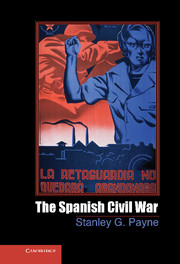Book contents
- Frontmatter
- Contents
- Chronology of Major Events
- Glossary
- Preface
- Introduction Civil War in Twentieth-Century Europe
- 1 Modernization and Conflict in Spain
- 2 From Revolutionary Insurrection to Popular Front
- 3 The Breakdown of Democracy
- 4 The Military Insurrection of the Eighteenth of July
- 5 The Battle of Madrid – the First Turning Point
- 6 Revolution
- 7 Terror
- 8 A War of Religion
- 9 Franco's Counterrevolution
- 10 Foreign Intervention and Nonintervention
- 11 Soviet Policy in Spain, 1936–1939
- 12 The Propaganda and Culture War
- 13 A Second Counterrevolution? The Power Struggle in the Republican Zone
- 14 The Decisive Northern Campaigns of 1937–1938
- 15 The War at Sea and in the Air
- 16 Civil Wars within a Civil War
- 17 The War in Perspective
- Conclusion Costs and Consequences
- Select Bibliography
- Index
- References
7 - Terror
Published online by Cambridge University Press: 05 September 2012
- Frontmatter
- Contents
- Chronology of Major Events
- Glossary
- Preface
- Introduction Civil War in Twentieth-Century Europe
- 1 Modernization and Conflict in Spain
- 2 From Revolutionary Insurrection to Popular Front
- 3 The Breakdown of Democracy
- 4 The Military Insurrection of the Eighteenth of July
- 5 The Battle of Madrid – the First Turning Point
- 6 Revolution
- 7 Terror
- 8 A War of Religion
- 9 Franco's Counterrevolution
- 10 Foreign Intervention and Nonintervention
- 11 Soviet Policy in Spain, 1936–1939
- 12 The Propaganda and Culture War
- 13 A Second Counterrevolution? The Power Struggle in the Republican Zone
- 14 The Decisive Northern Campaigns of 1937–1938
- 15 The War at Sea and in the Air
- 16 Civil Wars within a Civil War
- 17 The War in Perspective
- Conclusion Costs and Consequences
- Select Bibliography
- Index
- References
Summary
To understand the savage repressions that took place in Spain, the character of the revolutionary civil wars of the first half of the twentieth century must be kept in mind. These were conflicts of the transition to “classical modernity,” a process of massive cultural and social transformation that in some countries generated unprecedented tensions and hatreds. The only direct precursors would be found in the French Revolution and in the Paris Commune of 1871. Murderous mass repressions, first using the word “terror,” were a major feature of those earlier conflicts, and then reappeared in all the revolutionary civil wars of the first half of the twentieth century, first in Finland, then immediately afterward in Russia and elsewhere. Later, during the 1940s, they would reappear in the civil wars in Yugoslavia and Greece.
The bloodlust in revolutionary civil wars stems from the apocalyptic nature of such contests, the attempt on each side to create a new society and cultural order, not merely a different political system, totally purged of antagonistic elements. In these conflicts the enemy is perceived not as an ordinary political rival, but as a kind of metaphysical incarnation of evil that must be eradicated before it infects, or imposes the same terror on, one's own side. A revolutionary civil war is not an ordinary political contest, but a conflict of ultimates about society, religion, and culture, perceived to demand a total and uncompromising solution.
- Type
- Chapter
- Information
- The Spanish Civil War , pp. 103 - 110Publisher: Cambridge University PressPrint publication year: 2012

